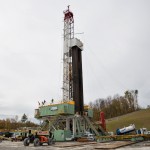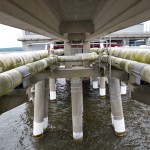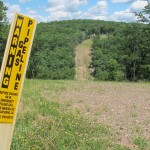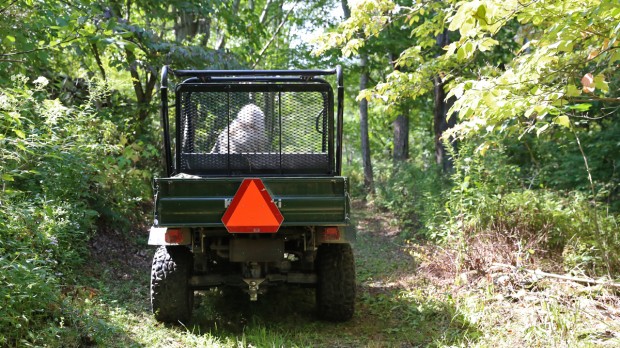A pair of studies released today by the U.S Geological Survey found low-to-moderate concentrations of naturally occurring methane in private water wells in Wayne and Pike Counties– a region of the state without Marcellus Shale drilling.
Those two counties fall under the jurisdiction of the Delaware River Basin Commission, which currently has a moratorium on fracking.
“These baseline studies are very important,” says USGS researcher Ronald Sloto. “People are very concerned about the environmental impact of shale gas drilling. In order to assess the impact of something, you need a ‘before’ and an ‘after’. Then you compare the two and see what the changes are.”
The samples were collected between 2012 and 2013. In Wayne County, Sloto examined 34 private water wells and found 65 percent had some level of detectable methane. Ten percent of the wells had relatively elevated levels of methane. In Pike County, 80 percent of the 20 tested wells had detectable methane, and again, only 10 percent had elevated levels.
The researchers note that the existence of naturally occurring methane does not absolve the gas industry of its role in contaminating some water supplies. Methane can be naturally occurring, but it can also migrate into water supplies through faulty well casings.
Continue Reading →
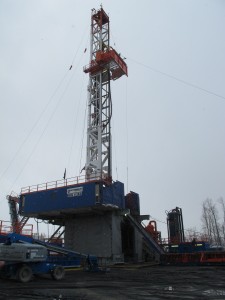
Susan Phillips / StateImpact PA
A drill rig in Susquehanna County.
The gas industry has spent almost $50 million to lobby state lawmakers, and try to influence elections since 2007. That’s according to a report out Thursday by Common Cause of Pennsylvania. “Marcellus Money” tracks campaign and lobbying dollars that must be reported to Pennsylvania’s Department of State. But Common Cause director Barry Kauffman says the total does not account for donations to the “independent” non-profits, which are not required to disclose donations following recent Supreme Court rulings.
“In the aftermath of the Supreme Court’s Citizens United and McCutcheon decisions, the gas industry can channel campaign money into other organizations that will hide the industry’s fingerprints,” said Kauffman.
As an example, Kauffman points to donations made by shale executives John Hess, of Hess Corp., and Trevor Rees Jones from Chief Oil and Gas, whose combined contributions total more than $500,000 to the Republican Governors Association, which subsequently donated more than $5.8 million to Tom Corbett’s failed re-election bid. Governor Corbett has gained the most from industry largess over the years. Natural gas industry interests have given the governor $2,084,241 since 2007. That figure includes industry employees as well as industry political action committees. In contrast, Common Cause calculated industry donations to Governor-elect Tom Wolf as $53,500.
Wolf also received support from billionaire environmentalist Tim Steyer’s Next Gen Climate Action Committee, which spent money nationwide to defeat climate change deniers. Common Cause says the group spent at least $1.1 million on television ads attacking Corbett’s doubts surrounding climate change science. Continue Reading →
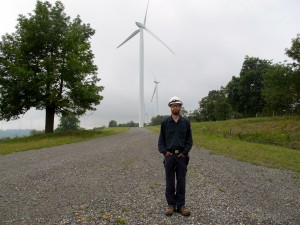
Katie Colaneri/StateImpact Pennsylvania
John Bennett is site manager at the Twin Ridges Wind Farm in Somerset County, Pa.
A new report shows the renewable and alternative energy industry supports more than 13,000 jobs in Pennsylvania.
The Keystone Energy Efficiency Alliance and Environmental Entrepreneurs – the two nonprofit organizations that put out the report – are touting it as the first full accounting of these jobs, which are not tracked by the state.
The Department of Labor Statistics only counts employment in the coal, oil, gas, and nuclear energy sectors and puts out a monthly report on Marcellus Shale natural gas drilling jobs. The agency gets statistics on solar and wind jobs, for example, from trade associations.
“There hasn’t been formal data on these types of jobs in Pennsylvania,” said KEEA Executive Director Brian Kauffman. “So that was one of the major motivations [for the report] to get a sense of where we are so we can get a sense of where we’re going.”
Continue Reading →
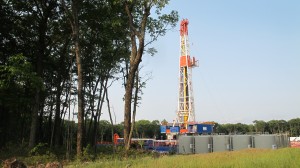
Marie Cusick/ StateImpact Pennsylvania
Fewer Americans now say they support the expanded use of fracking.
A new poll from the Pew Research Center shows public support for fracking has declined since last year.
In a survey conducted last week, 41 percent of respondents said they favor the increased use of fracking, while 47 percent say they are opposed.
Enthusiasm has dwindled since Pew surveyed people in March 2013. Back then, there was more support (48 percent) than opposition (38 percent). In a 2012 survey most Americans said they had heard little or nothing at all about fracking.
There is still a strong partisan and gender divide over the issue. More Republicans (62 percent) favor increased fracking, compared to 29 percent of Democrats. Women are far more likely to oppose it than men are.
Continue Reading →
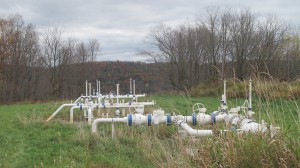
Marie Cusick/ StateImpact Pennsylvania
Natural gas gathering lines in Bradford County.
A one-day conference next week will focus exclusively on the midstream side of the natural gas business.
The first annual Midstream PA conference is co-hosted by Penn State and Shale Directories. It will be held next Tuesday at the Penn Stater in State College and bring together some of the biggest midstream companies and drillers in the state– including Williams, UGI Energy Services, Cabot Oil & Gas, and Range Resources.
The term “midstream” covers everything from gathering lines, to compressor stations, and interstate pipelines– basically the infrastructure needed to move gas from the well to end users.
You can think of pipelines as “part two” of the drilling boom.
“We have all this gas and liquids,” says Matt Henderson, of Penn State’s Marcellus Center for Outreach and Research. “Now the issue is getting it to market. The midstream is the bottleneck.”
Continue Reading →
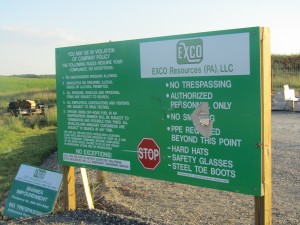
Kim Paynter / Newsworks/WHYY
A sign warns against trespassing on a frack wastewater impoundment in Bradford County.
In 2005, Pennsylvania had 11 frack water pits. Just eight years later, aerial maps show that number has jumped to 529. It’s unclear how many of these sites store fresh water used for fracking, and how many store the toxic wastewater that results from oil and gas drilling operations. The Department of Environmental Protection could not provide the data to public health researchers working with Geisenger on an NIH funded health impact study. So the researchers turned to the nonprofit data sleuths from SkyTruth, who have documented the impoundents with the help of USDA aerial imagery and citizen scientists from around the world. Smithsonian.org recently reported on how the project was initiated by public health researchers from Johns Hopkins:
Brian Schwartz, an environmental epidemiologist at Johns Hopkins Bloomberg School of Public Health and his colleagues have teamed up with Geisinger Health System, a health services organization in Pennsylvania, to analyze the digital medical records of more than 400,000 patients in the state in order to assess the impacts of fracking on neonatal and respiratory health.
While the scientists will track where these people live, says Schwartz, state regulators cannot tell them where the active well pads and waste pits are located. Officials at Pennsylvania’s Department of Environmental Protection (DEP) say that they have simply never compiled a comprehensive list.
A spokesman for DEP told the Observer-Reporter that the department can’t produce a list of impoundments that include smaller wastewater storage sites because they have a different classification. The DEP sent the reporter to another nonprofit that tries to fill the state’s data and information gap – FracTracker. But FrackTracker says the data they get from DEP on the location of frack ponds is “woefully incomplete.”
“We are big fans of the SkyTruth dataset here at FracTracker, but it is a shame that it is needed,” said Matt Kelso, manager of data and technology at FracTracker Alliance. ”We wish that the PA DEP would publish better data about this aspect of the oil and gas extraction business.”
Continue Reading →

Marie Cusick/ StateImpact Pennsylvania
Anti-fracking activist Vera Scroggins says she wants to appeal a court ruling that permanently bars her from Cabot Oil & Gas sites.
A Susquehanna County judge has ruled that 63-year-old anti-fracking activist Vera Scroggins will be permanently barred from setting foot on Cabot Oil & Gas sites.
Scroggins has been a thorn in the company’s side for years. She hosts a lot of citizen gas tours around Susquehanna County where Cabot has most of its operations. The company says she has repeatedly trespassed on its property and poses a safety risk.
“I’d like to appeal it,” Scroggins says of the ruling. “I consider it an unfair decision that is further restricting me– to keep me from exposing Cabot and the gas industry.”
Cabot spokesman George Stark says the company is pleased with the outcome.
“We hope that Ms. Scroggins is now able to respect the judge’s parameters, which have been reestablished unequivocally,” he wrote in an email. “We are hopeful that this finally marks an end to these events.”
The feud made international news earlier this year when Cabot got a sweeping (yet temporary) court injunction against her– effectively barring her from nearly half the county. In March the order was revised to be much less restrictive. It blocked her from Cabot sites and required she maintain a 100 foot buffer zone. However, that revised order was still temporary and the two sides were negotiating a permanent deal about where she can and can’t go.
Continue Reading →

Kimberly Paynter/WHYY
Governor-elect Tom Wolf has picked former Secretary of the Pa. Department of Environmental Protection, Katie McGinty to be his chief of staff.
Pennsylvania’s Governor-elect Tom Wolf has tapped Katie McGinty, a former challenger and state environmental protection secretary, to be his chief of staff.
After finishing fourth in the June primary, McGinty led the Fresh Start political action committee that campaigned on behalf of Wolf and other democrats. She will help with the transition to the next administration before assuming her new role after the inauguration on January 20.
McGinty ran the state Department of Environmental Protection from 2003 to 2008 under Governor Ed Rendell and was the first woman to hold the position in Pennsylvania. She is also a former staffer under President Bill Clinton who named her chair of the White House Council on Environmental Quality.
“In federal and state government, Katie worked with diverse interests to achieve meaningful change in difficult environments,” said Wolf in a statement. “Her experience will help me work with Republicans and Democrats to move Pennsylvania forward.”
One major item on Wolf’s agenda is passing a 5 percent severance tax on natural gas drilling, which may be a tough sell in the state’s Republican-controlled legislature.
Continue Reading →
Prev
Next

(Lindsay Lazarski/WHYY) permalink
Nancy Baker looks through a scrap book of letters, photos, maps, and records of her family’s forest in Bradford County, Pennsylvania.
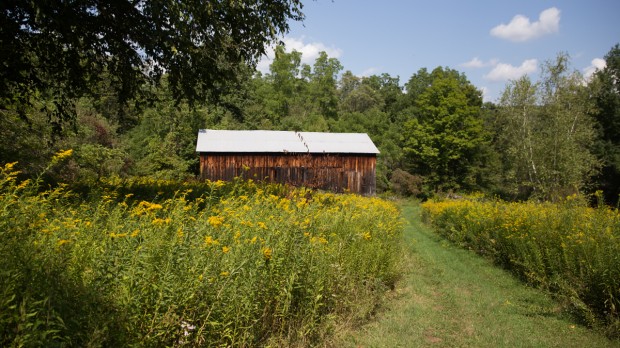
(Lindsay Lazarski/WHYY) permalink
The barn sided with hemlock wood was original built in the 1860’s when the land was used for farming.
(Lindsay Lazarski/WHYY) permalink
Nancy Baker (bottom right) walks among giant hemlock trees at Panther Lick in Bradford County, Pennsylvania. Her hemlocks are infested with the woolly adelgid. (Lindsay Lazarski/WHYY)
(Lindsay Lazarski/WHYY) permalink
The canopy of dead ash trees allows more light into the forest, which encourages the growth of invasive species.
(Lindsay Lazarski/WHYY) permalink
Many of the ash trees have fallen prey to emerald ash borer. Baker points to evidence of an exit hole from the invasive beetle.
Invasive vines wrap around trees of the forest on the north facing slope. Baker treated these vines in order to rid her forest of them.
